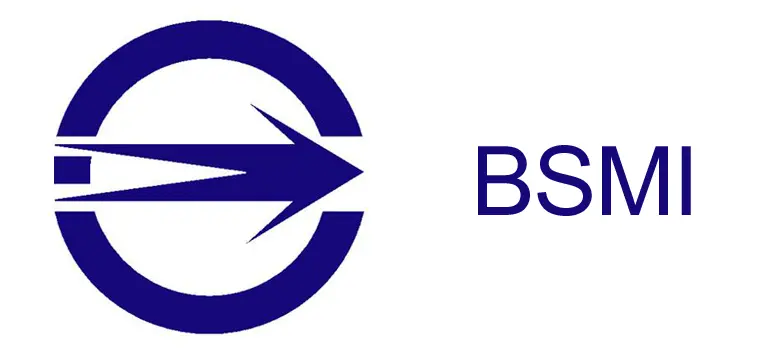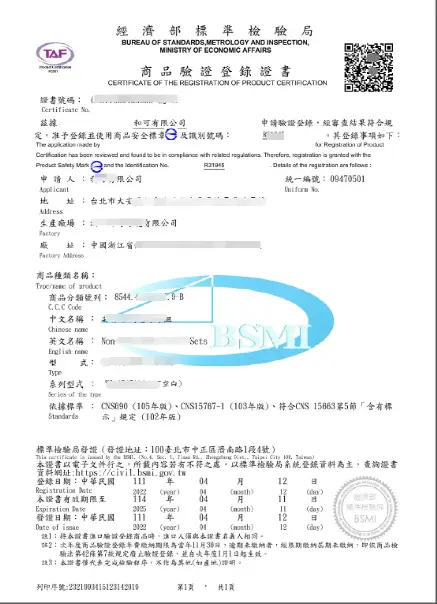
Introduction to Taiwan BSMI Certification
What is Taiwan bsmi?
BSMI stands for Bureau of Standards, Metrology and Inspection, under the Ministry of EconoMIC Affairs in Taiwan. BSMI establishes product inspection standards for electronic and electrical products entering the Taiwanese market. bsmi certification is mandatory, requiring products to comply with safety and emc testing and other relevant inspections before they can be authorized to use the BSMI mark.
Taiwan BSMI certification is mandatory and encompasses requirements for both EMC and Safety. However, BSMI currently does not involve factory inspections, but adherence to standards set by the Bureau is obligatory. The certification process for BSMI involves product inspection and registration supervision.

Taiwan BSMI Certification Modes:
Currently, there are three application methods:
1. Type Approval:
Type approval includes two categories:
- Type Approval (EMC + Safety): Implemented since January 1, 2004, covering 178 types of electronic and electrical products. Applicable standards: EMC + Safety. RequiRED documents include product type approval application form, company or factory license, test reports, photos, labels, key components prone to electromagnetic interference, diagrams, manuals, and technical documents for safety. Certificate validity: Three years, with one extension possible.
- EMC Type Approval: Enforced since November 1, 2002. Applicable to 61 electronic and electrical products with only EMI requirements and 124 electronic and electrical products requiring EMI + safety reports (if safety requirements exist). Required documents include EMC type approval application form, test reports, photos, labels, EMC key lists, diagrams, and manuals.
2. Certification Registration:
Requirements: EMI + Safety. Required documents include product type approval application form, company or factory license, test reports, photos, labels, components prone to electromagnetic interference, diagrams, manuals, technical documents for safety, and conformity declarations. Certificate validity: Three years, with one extension possible.
3. Declaration of Conformity:
Enforcement date: January 18, 2002. Applicable to 19 types of information technology equipment components. Applicable standard: CNS13438 (EMC only). Required documents include declaration of conformity, test reports, technical documents: photos, labels, components prone to electromagnetic interference, diagrams, and user manuals. No certificate issued.
Note: If a product has obtained type approval, inspections for customers will be simplified. For products applying for certification registration, no customer inspections will be conducted, instead, market random sampling will be adopted.
BSMI Certification Product Scope:
1. Mandatory Commodities Inspection Mark (CI MARK): Electrical products (e.g., household appliances), electronic products (e.g., information devices and entertainment audiovisual products), mechanical products (e.g., power tools), chemical products (e.g., tires and toys).
2. Voluntary Standard Mark (CNS MARK): Industrial products, building materials, wires, household appliances, automotive parts, industrial raw materials.
3. Voluntary Product Certification Mark (VPC MARK): Important components for safety, digital set-top boxes, lamp holders, battery chargers, restricted hazardous substances, lithium batteries, sports and fitness equipment, etc.
Taiwan BSMI Certification Requirements:
Mandatory: Yes
Content: Safety and EMC
Factory Inspection: Not required
Local Testing: Required
Local Representative: Required
Certificate Validity Period: 3 years (renewable for another 3 years)
Annual Fee: USD 175/certificate
Voltage: Single-phase 110V/220VAC, three-phase 220V, frequency 60Hz
Duration: Generally 3-5 weeks.
Cost of Taiwan BSMI Certification:
The cost of BSMI (Bureau of Standards, Metrology and Inspection) certification mainly includes the following:
1. Application fee: For BSMI certification, depending on the type and quantity of products, it ranges from approximately $161 to $644.
2. Testing fees: Involving electromagnetic compatibility, electrical safety, environmental reliability, etc., fees vary depending on the type and quantity of products, generally ranging from $500 to $1200.
3. Process assessment fee: This is the evaluation fee for production processes, quality control, and management systems, usually ranging from $161 to $322.
4. Annual certification fee: Enterprises need to pay an annual certification fee to maintain the validity of their certification. This fee also depends on the type and scale of products, generally ranging from $161 to $322.
5. Factory audit fees: Involving audits of production factory quality control requirements, fees may range from $322 to $966.
6. Other expenses: This may include other possible expenses such as consULtancy fees, transportation costs, etc. These fees vary depending on the institution or individual and generally range from $161 to $322.
Taiwan bsmi certificate

It is worth noting that the above fees are subject to change, and the specific situation should be based on the latest information released by the official authorities.
Email:hello@jjrlab.com
Write your message here and send it to us
 Amazon Japan METI A Domestic Administrator Service
Amazon Japan METI A Domestic Administrator Service
 What is "Amazon Japan PSE: A Domestic Adminis
What is "Amazon Japan PSE: A Domestic Adminis
 What Does "ASTM F963-17 Certified" Mean?
What Does "ASTM F963-17 Certified" Mean?
 ASTM F963 Board Games Compliance Testing
ASTM F963 Board Games Compliance Testing
 ASTM F963 Flammability Test
ASTM F963 Flammability Test
 ASTM F963 Teether Compliance Testing
ASTM F963 Teether Compliance Testing
 How to get an ASTM F963 Test Report?
How to get an ASTM F963 Test Report?
 ASTM F963-16 Fidget Spinner Compliance Testing
ASTM F963-16 Fidget Spinner Compliance Testing
Leave us a message
24-hour online customer service at any time to respond, so that you worry!




